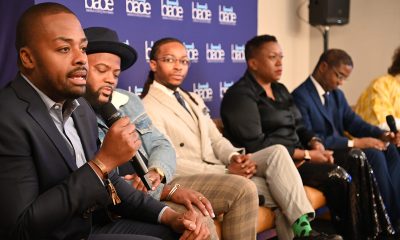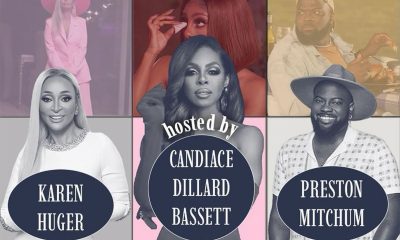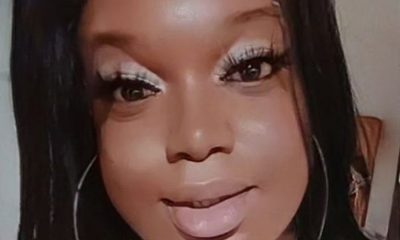Local
D.C. LGBTQ community reckons with anti-Blackness, gentrification after Nellie’s incident
Preston Mitchum among those calling for boycott of U Street bar
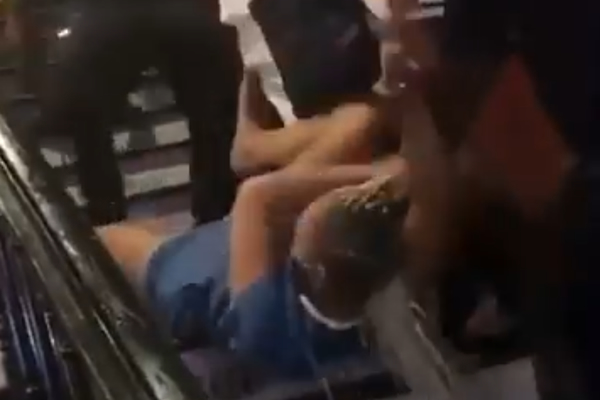
A video posted to Twitter earlier this month showed a member of Nellie’s Sports Bar’s security detail dragging Keisha Young, a 22-year-old Black woman, down the stairs by her hair after confusing her with a different customer who had reportedly tried to sneak liquor into the bar.
The video went viral, attracting massive online attention, including from Mayor Muriel Bowser and many others. A second video that appears to show an altercation between Young and other patrons seconds before security dragged her down the stairs has also emerged.
“Obviously, entrepreneurs enforce rules in their restaurants, but they’re not allowed to assault anybody,” Bowser told the Washington Post. “If that’s a matter for the Metropolitan Police Department, we’ll take it up.”
In a Facebook post that has since been deleted, Nellie’s responded to the surfacing of the video.
“We were incredibly upset and disturbed to see the unfortunate event that took place at Nellie’s last night,” referring to the June 12 incident. “We are undergoing a full investigation of the situation. At Nellie’s, we foster an inclusive and safe environment, so events like this are completely unacceptable to us.”
The statement garnered negative reactions online, forcing Nellie’s to issue a follow-up statement, part of which read, “We offer a heartfelt apology to all who witnessed the horrific events of the past weekend … Nellie’s will be closed this week as we evaluate this regrettable situation.”
Since Nellie’s closed and a protest in solidarity with Young was staged outside the bar on June 13, the queer community has been forced to reckon with what some describe as Nellie’s history of racist practices, as well as D.C.’s increasing gentrification.
Accusations of racism at Nellie’s are not new. Whitman-Walker Health in a June 15 tweet noted the incident that involved Young “is not the first time we have heard calls for respect for Black patrons of Nellie’s Sports Bar.” The Capital Pride Alliance in its statement about what happened to Young said Nellie’s response “will impact the CPA’s relationship with Nellie’s.”
“Over the years, the culture [at Nellie’s] became one that seemed hell-bent on pushing Black patrons out and making it a bar more for straight people and white gay men. In fact, [owner] Doug Schantz has gone on record calling his bar ‘straight-friendly’,” said Preston Mitchum, director of policy for Unite for Reproductive and Gender Equity (URGE) and a former avid Nellie’s patron.
Mitchum moved to D.C. in 2011 and started frequenting Nellie’s because of its reasonably priced drinks, which “sounded good” to him as a then-25-year-old professional.
On the alleged racial profiling at Nellie’s, Mitchum added, “I noticed that when more Black people went, particularly on Sundays, security increased. That always felt peculiar because Friday and Saturday nights were packed and had less security, based on observation. Staff also paid minimal attention to the interactions [between] white patrons. In short, there were many racist interactions and drunken behavior, and no one moved a muscle.”
Mitchum also claims that Black patrons were treated poorly compared to white customers in similar situations. He recalls incidents in which police officers were called on Black patrons and they were kicked out whereas many white patrons received warnings or “had fights broken up.”
Nellie’s in 2018 was embroiled in controversy over its display of a Blue Lives Matter flag on social media.
FOX 5 reported Nellie’s claimed to display the flag in support of LGBTQ officers who were “attending a meeting in a welcoming space.” However, many on social media were enraged by the display of the flag, which is viewed as opposing the Black Lives Matter movement, which hinges on advocating for victims of police brutality, and more importantly, reforming or abolishing the police and replacing it with community security efforts to reduce instances of racial profiling and Black deaths.
As a Black customer invested in making Nellie’s safer for him and the rest of the POC queer community, Mitchum said he participated in a number of measures to help change the culture at Nellie’s.
In a Facebook post published on his page, Mitchum wrote, “Myself and others have written letters, did interviews, conducted ‘sensitivity’ trainings, met with the owner, and even planted ourselves as observers to document our experiences.”
The efforts, however, were in vain, as according to Mitchum, Schantz did not take the efforts seriously.
For instance, Mitchum in June 2017 met with Schantz and his manager to discuss the issues at Nellie’s and to draft solutions moving forward. The meeting proved futile as Mitchum notes in a letter to Schantz, made public on social media, that among others things, asserts that Mitchum experienced rudeness from Schantz’s manager and that Schantz uttered statements with racist undertones.
“I have revisited our conversation many times and I’m still unsure of the purpose of your manager at our May 30 meeting. Not only did it create an attacking atmosphere of two-on-one, she was your ‘yes woman’ thus another person to shut down my opinion because it didn’t jive with both of yours,” penned Mitchum.
Mitchum added, “I hope you can genuinely realize that you equated hip-hop music (that uses “fuck” and the N-word) to violence … there is no valid statistical proof that creates a casual relationship between rap music and violence. Even as I pressed this fact, your response (as well as your manager’s) was ‘it’s his/my bar’ so you can play any music you like.”
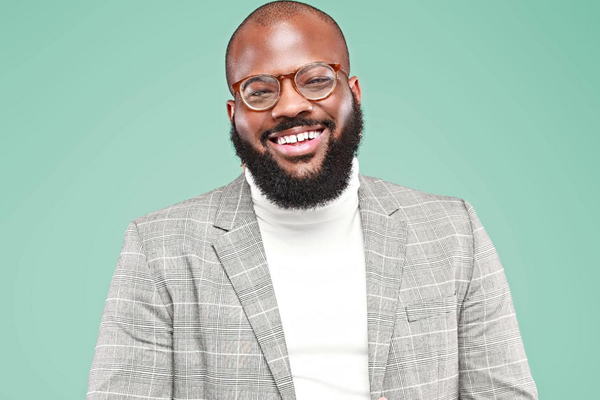
Given the lack of change in culture at Nellie’s and the recent incident involving Young, Mitchum and others have called for a boycott of the bar.
A protest was staged outside Nellie’s on June 13.
The Georgetown Voice reports that Nee-Nee Taylor, co-conductor of Harriet’s Dreams (a Black-led community defense organization) said, “we ask the people to protest and boycott Nellie’s because the owner, who is a white man, don’t care about Black women.”
The Georgetown Voice also reports that Mitchum, who was present at the protest, “accused Nellie’s of relying on the business of Black patrons and gentrifying the local community while failing to care for its Black employees and patrons.”
As Mitchum reflects on how venues safe for Black LGBTQ people are disappearing, he mentions, “What was once ‘Chocolate City,’ we now see a city hovering around 50 percent Black. That’s intentional. I live a few blocks from U Street and anyone need not to be in the area to understand just how much the landscape has shifted.”
Regarding places to frequent now, Mitchum recommends Mr. Braxton’s Bar and Restaurant; Hook Hall; BIN 1301; and Fireplace.
The Washington Blade has reached out to Schantz for a response to Mitchum’s allegations but did not receive a response.
Michael K. Lavers contributed to this story.
District of Columbia
D.C. police seek help in identifying suspect in anti-gay threats case
Victim threatened with assault, called ‘faggot’ as he left Capitals game
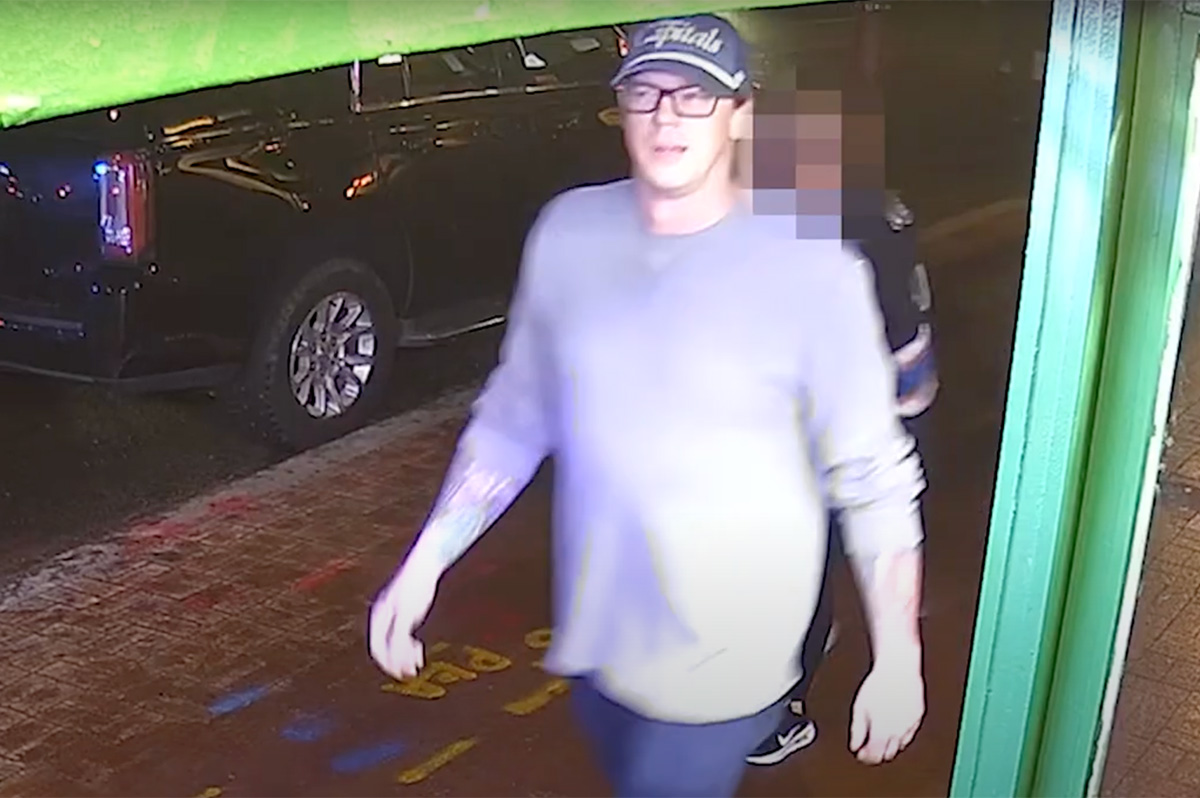
D.C. police are seeking help from the public in identifying a male suspect whose image was captured by a video surveillance camera after he allegedly shouted anti-gay slurs and threatened to assault a man at 6th and H Streets, N.W. on March 20 at about 9:54 p.m.
A police report says the victim told police the incident took place shortly after he exited the nearby Capital One Arena where he had attended a Washington Capitals hockey game.
The police report says the incident began when the victim saw the suspect yell a racist slur at a person behind the victim and started to berate a valet operator.
“Suspect 1 then turned his attention to Victim 1 and called him a ‘faggot’ among other homophobic slurs,” the report says. It says the victim then used his phone to record the suspect, prompting the suspect to walk away before returning and “snatching” the phone from the victim’s hand.
“Suspect 1 walked several feet as Victim 1 followed, requesting his phone back,” the report continues. “Suspect 1 stopped and turned to Victim 1 and while yelling other obscenities exclaimed ‘if you keep recording, I’m going to kick your ass.’” The report concludes by saying the victim was able to recover his phone.
It lists the incident as a “Threats To Do Bodily Harm” offense that is a suspected hate crime.
“Anyone who can identify this suspect or has knowledge of this incident should take no action but call police at 202-727-9099, or text your tip to the Department’s TEXT TIP LINE at 50411,” according to a separate police statement released April 23.
The statement says police currently offer an award of up to $1,000 to anyone who can provide information that leads to an arrest and indictment of the person or persons responsible for a crime committed in D.C.
D.C. police spokesperson Tom Lynch said the case has been under investigation since the incident occurred on March 20. He said the video image of the suspect, most likely obtained from a security camera from a nearby business, was released to the public as soon as it was obtained and processed through the investigation.
District of Columbia
Wanda Alston Foundation names new executive director
Longtime LGBTQ rights advocate Cesar Toledo to succeed June Crenshaw
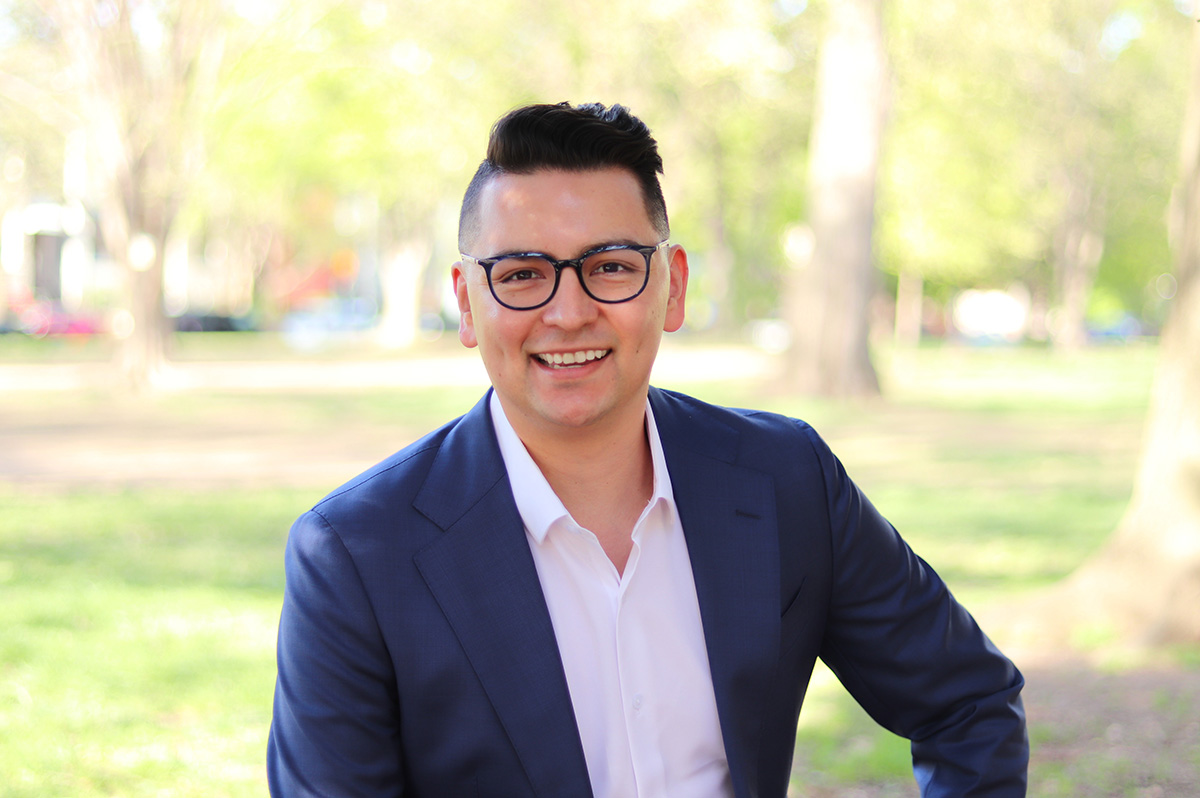
The Wanda Alston Foundation, the D.C.-based organization that has provided housing and support services for homeless LGBTQ youth since its founding in 2008, announced it has appointed longtime LGBTQ rights advocate Cesar Toledo as its new executive director.
In an April 22 statement, the organization said that as part of a planned leadership transition launched in November 2024, Toledo will succeed June Crenshaw, who Alston Foundation officials and LGBTQ community activists say has led the organization with distinction in her role as executive director for the past nine years.
In a statement released last November, the foundation announced Crenshaw was stepping down from her role as executive director after deciding to “to step into her next chapter.”
“June’s leadership has been truly transformative,” said Alston Foundation Board Chair Darrin Glymph in the group’s April 22 statement. “We are immensely grateful for her dedication and equally excited for the energy and experience that Cesar brings to lead us into this next chapter,” Glymph said.
“A seasoned LGBTQ+ advocate, Cesar brings over a decade of experience leading national campaigns, shaping public policy, and building inclusive communities,” the statement released by the group says. “Most recently, he served as the National LGBTQ+ Engagement Director for the Harris for President Campaign and has built a career focused on advancing equality and equitable education,” it says.
Biographical information about Toledo shows that immediately prior to working for the Harris For President Campaign, he served since April 2023 as deputy director for Democrats for Education Reform DC (DFER DC), a political group that helps to elect candidates for public office committed to quality education for all students, including minorities, people of color and LGBTQ youth.
Before joining DFER DC, Toledo served as political director for the LGBTQ+ Victory Fund, where he assisted in electing out LGBTQ candidates to all levels of public office across the U.S.
“I’m really excited about joining the Wanda Alston Foundation,” Toledo told the Washington Blade. “After a decade of working at the intersection of politics and policy and advancing political candidates and equitable education here in D.C., I wanted to shift my career to direct services to the most vulnerable folks in the LGBTQ+ family and our homeless youth,” he said.
Among other things, he said he would push for increasing the Alston Foundation’s visibility and mainlining its services for LGBTQ youth at a time when the national political climate has become less supportive.
A statement on its website says the Alston Foundation was founded in 2008 “in memory of Wanda Alston, a fierce LGBTQ+ activist, national advocate, and government official who was admired by District residents.”
The statement adds, “The foundation opened the first housing program in the nation’s capital in 2008 providing pre-independent transitional living and life-saving support services to LGBTQ+ youth.”
In a separate statement, the Alston Foundation announced it would hold a “thank you” celebration of appreciation for June Crenshaw from 6-8 p.m. on May 20 at Crush Dance Bar located at 2007 14th Street, N.W. in D.C.
“Let’s come together to celebrate her dedication and commitment for everything she has done for the LGBTQIA homeless youth population,” the statement says.
Virginia
Gay talk show host wins GOP nom for Va. lieutenant guv
John Reid becomes first out gay nominee for statewide office in state
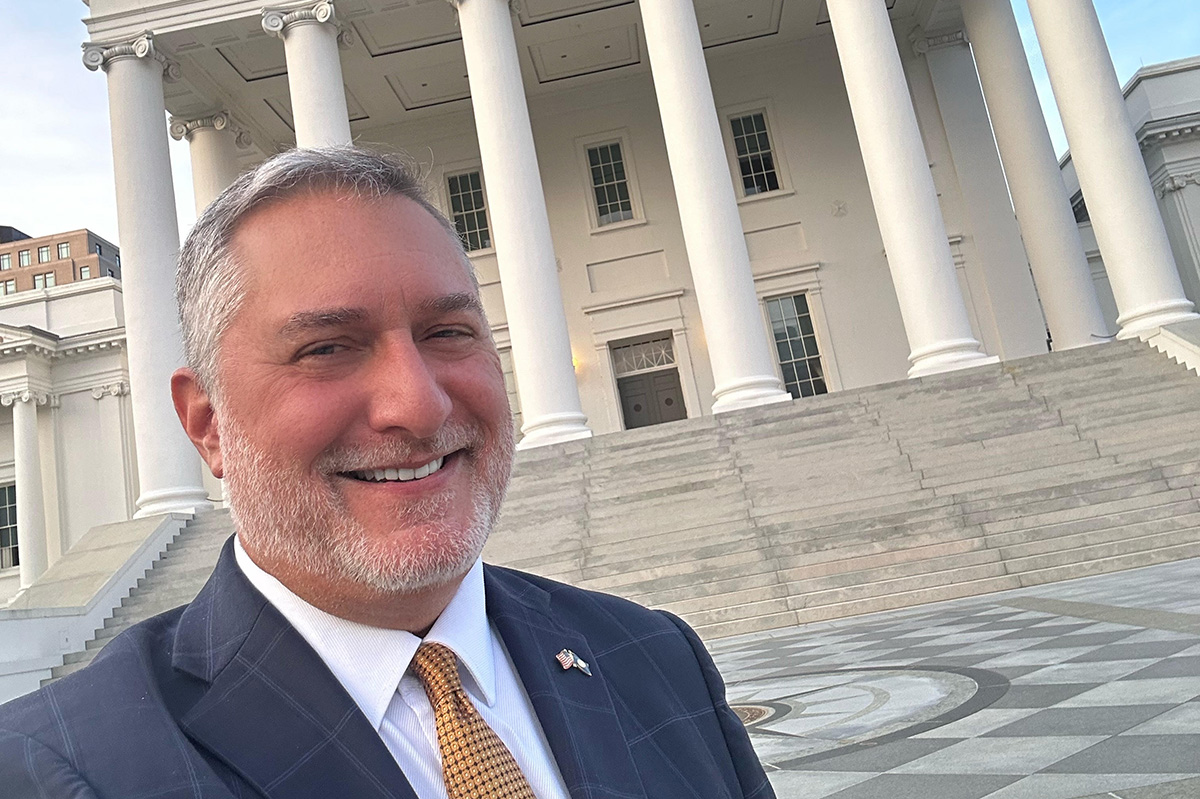
John Reid, a conservative gay radio talk show host in Richmond for many years, this week secured the Republican nomination for the office of lieutenant governor in Virginia, becoming the first known openly gay person to be nominated for a statewide office in that state.
Reid secured the nomination after his only rival in the Republican primary, Fairfax County Supervisor Pat Herrity, dropped out of the race this week for health reasons.
Herrity’s decision to withdraw from the race finalized the GOP nominees for Virginia’s three statewide contests in the November general election in what political observers are calling an unusually diverse GOP slate.
Current Virginia Lt. Gov. Winsome Earle-Sears, a Black woman, captured the GOP nomination for governor without a GOP opponent. Jason S. Miyares, a Hispanic man, is running for re-election as Virginia attorney general without a GOP rival. And Reid, a gay man, is the GOP nominee for lieutenant governor.
Reid will face one of six Democratic candidates for lieutenant governor who are competing in the June 17 Democratic primary.
The Blade spoke with Reid on Tuesday. Below is a partial transcript of that interview.
Blade: Is there a message you have for LGBTQ voters in Virginia, including Democrats, for why you think they should vote for you?
Reid: Well, the thing that I would say to gay voters who are looking and examining the candidates, is that I was out of the closet as a gay Republican publicly in very difficult rooms where people weren’t accepting of gay men – long before Donald Trump said I don’t care about this stuff.
And long before polite society said this was OK. So, in the ‘90s I came out on television and said on Oct. 11 – it was on National Coming Out Day. It was probably in 1996 or 1997. I started at the TV station in 1994. So, it was a couple of years into it.
I came out and said you never know your news anchor could be gay on National Coming Out Day. And everyone was appalled. How can you say this? You’re not supposed to say something like that. So even though I’m a Republican I know some people in the LGBT community are reflexively hostile to Republicans.
I took that step in public, and I think I helped change a lot of minds within the Republican Party and within central Virginia, which continues to be a pretty conservative place by being true to who I am. I spoke out in meetings around Republican staff and legislators and said I think we are not doing the right thing by being hostile to gay marriage.
We talk about the importance of family – Republicans talk about the importance of family, the importance of marriage as a fundamental building block of society. And a gay marriage is a net positive. Is it biblical to people who are following traditional Christian theology? No. But is it good for our society to have people in committed relationships? I think yes.
When we were going through the debate over gays in the military I said I see no reason that someone who is qualified to be in the military and can meet every single standard that everyone else is asked to meet, why should they not be in the Naval Academy, the Air Force Academy, West Point? Or serving as a grunt in active duty. Why would we exclude those people?
And those were very unpopular positions within the Republican Party.
Blade: Your campaign website says you have supported civil unions for same-sex couples. I could have missed seeing it, but I didn’t see an expression of support for gay marriage. Are you saying now that you support full same-sex marriage?
Reid: You know, you’re right. There is a distinction. And I think marriage is completely legitimate. Civil unions – if you want to go and sign paperwork at the courthouse – that’s great. If you want to be married and if a church wants to marry you if you find a church and religious leader and group that wants to bless that – that’s what I hope to do with my partner now.
Sometime in the near future I hope we will be married. And it’s very important to me as a Christian to be married in a church. So, that’s interesting. Most people would not draw that distinction. I appreciate that you’re drawing a distinction. I’m supportive of both.
Blade: Did you say you worked for a member of Congress? Can you say who that was?
Reid: George Allen, the senator from Virginia. And, of course, you and I – I know you’ve covered so many stories like this that you’ve brought together. But it was a very difficult position. When I started with Sen. Allen, he had a very libertarian attitude about this. The [Virginia State] constitutional amendment was not necessary. There was no need to go down that road.
And of course President Bush – George W. – was very assertive during the 2004 campaign. And then the issue continued to bubble up and you know we wound up with this amendment in the Virginia Constitution that banned gay marriage until the Supreme Court decision. And I was not supportive of that. And I voted for my boss, my senator, who I respected and still do respect.
Blade: Your website shows that your support for the gay community does not extend to the transgender community.
Reid: Yeah, I hate this. But I do think that our current focus on trans issues is where the gay rights movement has jumped the shark. And I think we’re losing support that we worked very diligently for decades to build with the average person. And I’m puzzled that the former leaders of the Human Rights Campaign had presidents when Elizabeth Birch and others – I don’t know what their stance is today.
I do recall that all of us who talked about gay rights issues focused on normalcy and that we would meet every standard that everyone else met. That all the vile things that were said about gays being pedophiles and grooming children – that simply was not true.
And I think we have stumbled into a very unfortunate and dangerous territory where we’re almost taunting the average person with an insistence that they accept drag queen story hour and the provocative books and provocative media that the average person would say, ‘You told us you were normal. – quote unquote normal – and now you are peddling an agenda which we don’t agree with and you’re being really aggressive about it.
And that’s really a difference. I know you’ve been covering it for a long time. I don’t know if you agree with this. I think we are peddling a very different political agenda today than the gay community was 20 years ago. And I think we should restrain ourselves and be cautious about that. And I think we’re in dangerous territory with the general population. And I’d urge caution about that.
Blade: Online reports show that there are as many as six Democratic candidates competing for the lieutenant governor’s position in the June 17 Democratic primary. Do you know any of them?
Reid: I’m familiar with most of them. Some are from the Richmond area. And I believe they are all very supportive of gay rights, which is I think a good thing. My reason for challenging them as a Republican – and I think there are other places where there is a lack of appropriate leadership and good judgment. And so, I don’t expect the gay issue would be a real issue. The trans issue may be a point of contention in the race.
But I don’t think the gay issue – and I do draw a distinction between the two — I don’t think that will be a real dividing line with those Democrat[ic] candidates.
Blade: So unlike when you were a TV news anchor, on your radio talk show were you able to offer more opinions and commentary?
Reid: That’s correct. There was a lot of opining, no script. So, I was able to tell stories about how I traveled to Miami, and I went to Washington. I went to the Kennedy Center and shared some of my life and lifestyle as appropriate with the audience.
Blade: Well, thank you for this interview.
Reid: I’m happy to talk to you. One of the reasons I called you back is that the political consultants have always told me don’t talk to anybody that might disagree with you. And I reject that. I have already lived 30 years as an out gay man. And it has been very difficult. And I would like to make it easier for the next generation to live their authentic selves. … Calling you and talking to you against the advice of all these people who say never do that, I’m hopeful that my willingness to engage and be candid will ultimately be well received, I hope.

